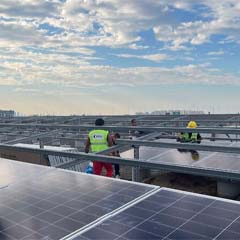Working Principle and Future Development of Solar Panels: An Efficient and Eco-Friendly Energy Solution
Apr 27, 2025
Solar panels work through the photovoltaic effect, which converts sunlight into electricity. Each solar panel is made up of multiple photovoltaic cells, typically composed of semiconductor materials like silicon. When sunlight hits these materials, photons excite electrons, creating an electrical current. This current is then transmitted through wires to power batteries or other devices, providing energy for homes or industries.
By converting solar energy into clean electricity, solar panels not only save on electricity bills but also reduce carbon emissions, making them an effective solution to the global energy crisis and climate change.
Environmental Benefits of Solar Panels
The use of solar panels is not only economically beneficial but also has a profound positive impact on the environment. First, solar energy is a renewable resource—abundant and inexhaustible—and its use does not produce any pollutants or greenhouse gas emissions. Thus, widespread adoption of solar panels helps reduce reliance on fossil fuels, effectively mitigating air pollution and slowing global warming.
Additionally, the manufacturing and lifespan of solar panels are continually being optimized. Modern solar panels are produced in increasingly eco-friendly ways, and recycling technologies are advancing, ensuring that their environmental footprint is minimized.
Evolution of Solar Photovoltaic Efficiency and Its Bright Future
Solar photovoltaic efficiency has been steadily improving over the years, with advancements in photovoltaic materials and cell design. From the initial efficiency of 5-6%, to the current standard of 15-20%, technological advancements have made solar power more economically viable and practical.
Particularly, N-Type Bifacial Solar Panel utilize both sides of the panel to absorb sunlight, improving efficiency. This technology is making solar panels more adaptable in various environments, and as technology progresses, the future of solar energy systems looks brighter.
The Importance of Solar Panel Maintenance and Repair
Although solar panels are highly durable, regular maintenance and repairs are essential for their long-term performance. While solar panels typically last for over 20 years, improper cleaning or lack of inspection can lead to reduced efficiency. Common maintenance tasks include:
Regularly cleaning the surface of solar panels to remove dust, dirt, and debris, ensuring they absorb as much sunlight as possible.
Checking the connections of the panels to ensure proper electrical flow.
Periodically inspecting the inverter and other system components to ensure smooth operation.
Timely repairs can extend the lifespan of the system and maintain its efficiency.
3 Best Places for Your Solar Panel Installation
The location of solar panel installation plays a crucial role in their efficiency. Different installation environments can impact the performance of solar panels. Here are the three best places for solar panel installation:
Roof: The roof is the most common and ideal location for installation. Most homes provide enough space for solar panels, and roofs are often unobstructed, receiving maximum sunlight.
Solar Carports: Solar carports are another excellent installation option. Solar panels installed on carports not only provide electricity for the home but also charge electric vehicles.
Open Land: For homes or buildings without suitable rooftops, open land can serve as an ideal space for solar panel installation. Large-scale solar farms can convert vast areas of land into electricity, meeting substantial energy demands.
What Are The Main Advantages of Solar Panels?
Solar panels offer numerous notable benefits, especially in the following areas:
Environmentally Friendly: Solar energy is clean and reduces the release of greenhouse gases, which helps decrease air pollution.
Sustainability: Solar energy is a renewable resource, making it a long-term energy solution.
Cost Savings: Installing solar panels reduces reliance on traditional energy sources, significantly lowering electricity bills in the long run.
Energy Independence: Solar panels allow homeowners and businesses to become less dependent on the external power grid, enhancing energy independence.
Choosing the right solar panel system not only boosts energy efficiency but also offers long-term economic returns.
N-Type Solar Panels: The Future of Solar Energy
For those seeking efficient, durable, and environmentally friendly solar panels, Full Black N-Type Solar Panel Company offers excellent N-type all-black solar panels. Compared to traditional P-type solar cells, N-type panels offer superior efficiency, durability, and low-temperature performance. Furthermore, N-type bifacial solar panels (N Type Bifacial Solar Panel Manufacturer) capture sunlight from both sides, increasing power generation efficiency, making them a key development in the future of solar energy.
If you’re looking for bulk purchasing, wholesale All black Solar Panels provides high-quality, competitively priced solar panels, making your solar energy project more economical and sustainable.


